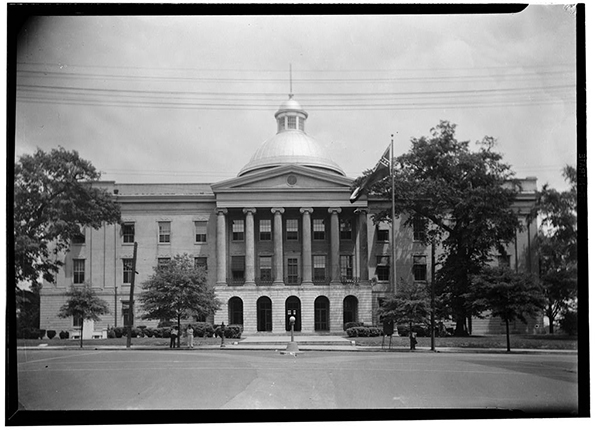Historic Document
A Declaration of the Immediate Causes which Induce and Justify the Secession of the State of Mississippi from the Federal Union (1861)
State of Mississippi | 1861

Library of Congress, Prints and Photographs Division, HABS
Summary
Four more Southern states – Virginia, North Carolina, Tennessee and Arkansas – joined the original seven in secession after Lincoln announced his intention to act against the new Southern Confederacy. All of these states had long legalized slavery, and in the secession ordinances passed by them, slavery was prominently cited as a justification, along with the failure of the non-slave states of the Union to enforce national pro-slavery statutes like the Fugitive Slave Law (1850), President Lincoln’s feared obstruction of admission of further slave states to the Union, and the disruption of slavery where a legally-protected institution. Lincoln, in his First Inaugural Address, protested that he had no authority to meddle with slavery in the states where it was legal, but few slaveholders believed this. Mississippi was in the first wave of seven state secessions, on January 9, 1861.
Selected by

Allen C. Guelzo
Director, Initiative on Politics and Statesmanship, James Madison Program in American Ideals and Institutions, Princeton University

Darrell A.H. Miller
Melvin G. Shimm Professor of Law at Duke University School of Law
Document Excerpt
In the momentous step which our State has taken of dissolving its connection with the government of which we so long formed a part, it is but just that we should declare the prominent reasons which have induced our course.
Our position is thoroughly identified with the institution of slavery – the greatest material interest of the world…and a blow at slavery is a blow at commerce and civilization. That blow has been long aimed at the institution, and was at the point of reaching its consummation. There was no choice left us but submission to the mandates of abolition, or a dissolution of the Union, whose principles had been subverted to work out our ruin.
…The hostility to this institution…has grown until it denies the right of property in slaves, and refuses protection to that right on the high seas, in the Territories, and wherever the government of the United States had jurisdiction. It refuses the admission of new slave States into the Union, and seeks to extinguish it by confining it within its present limits, denying the power of expansion. It has nullified the Fugitive Slave Law in almost every free State in the Union, and has utterly broken the compact which our fathers pledged their faith to maintain. It advocates negro equality, socially and politically, and promotes insurrection and incendiarism in our midst.
…Utter subjugation awaits us in the Union, if we should consent longer to remain in it. It is not a matter of choice, but of necessity. We must either submit to degradation, and to the loss of property worth four billions of money, or we must secede from the Union framed by our fathers, to secure this as well as every other species of property. For far less cause than this, our fathers separated from the Crown of England.
Our decision is made. We follow their footsteps. We embrace the alternative of separation; and for the reasons here stated, we resolve to maintain our rights with the full consciousness of the justice of our course, and the undoubting belief of our ability to maintain it.




